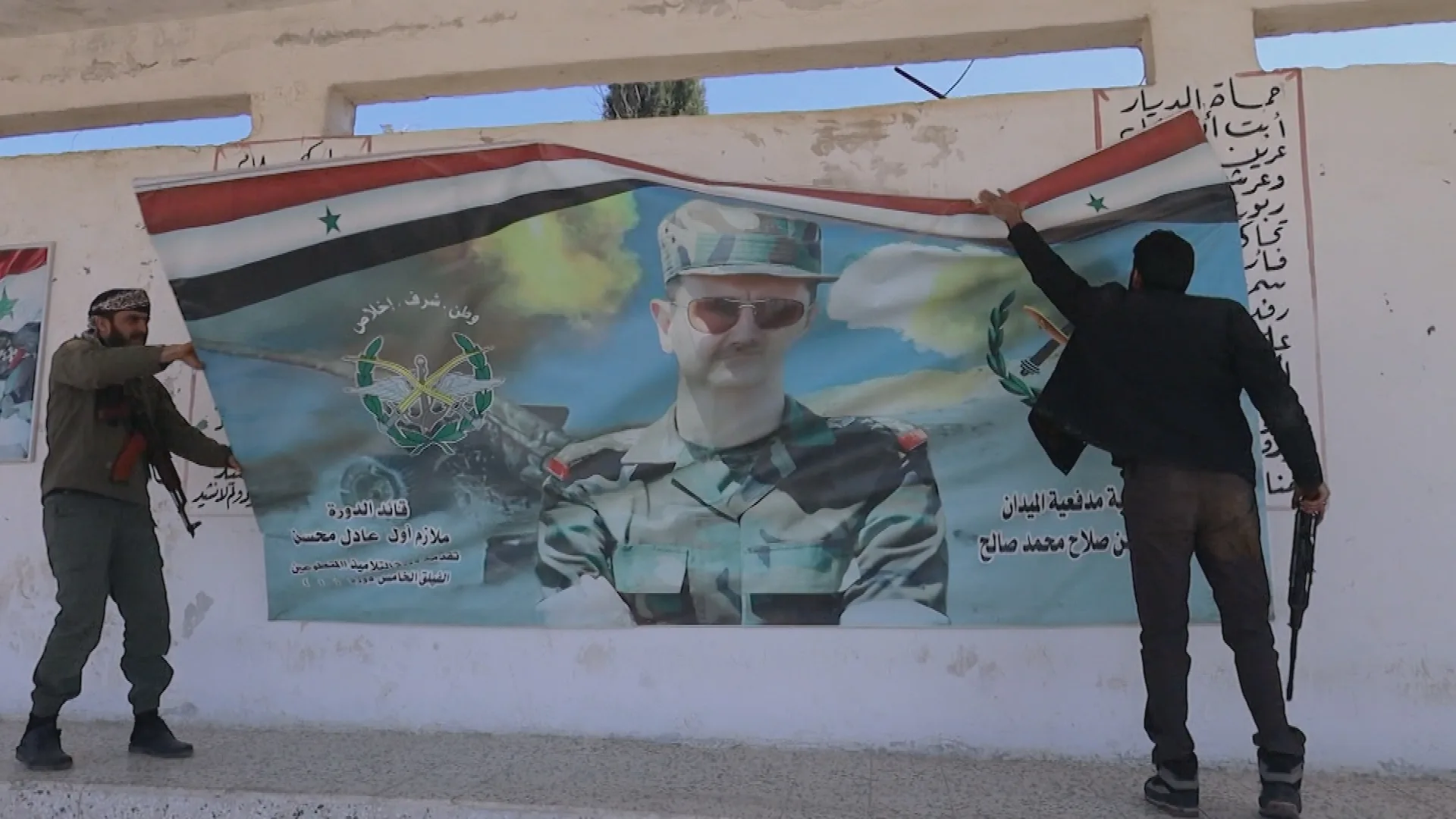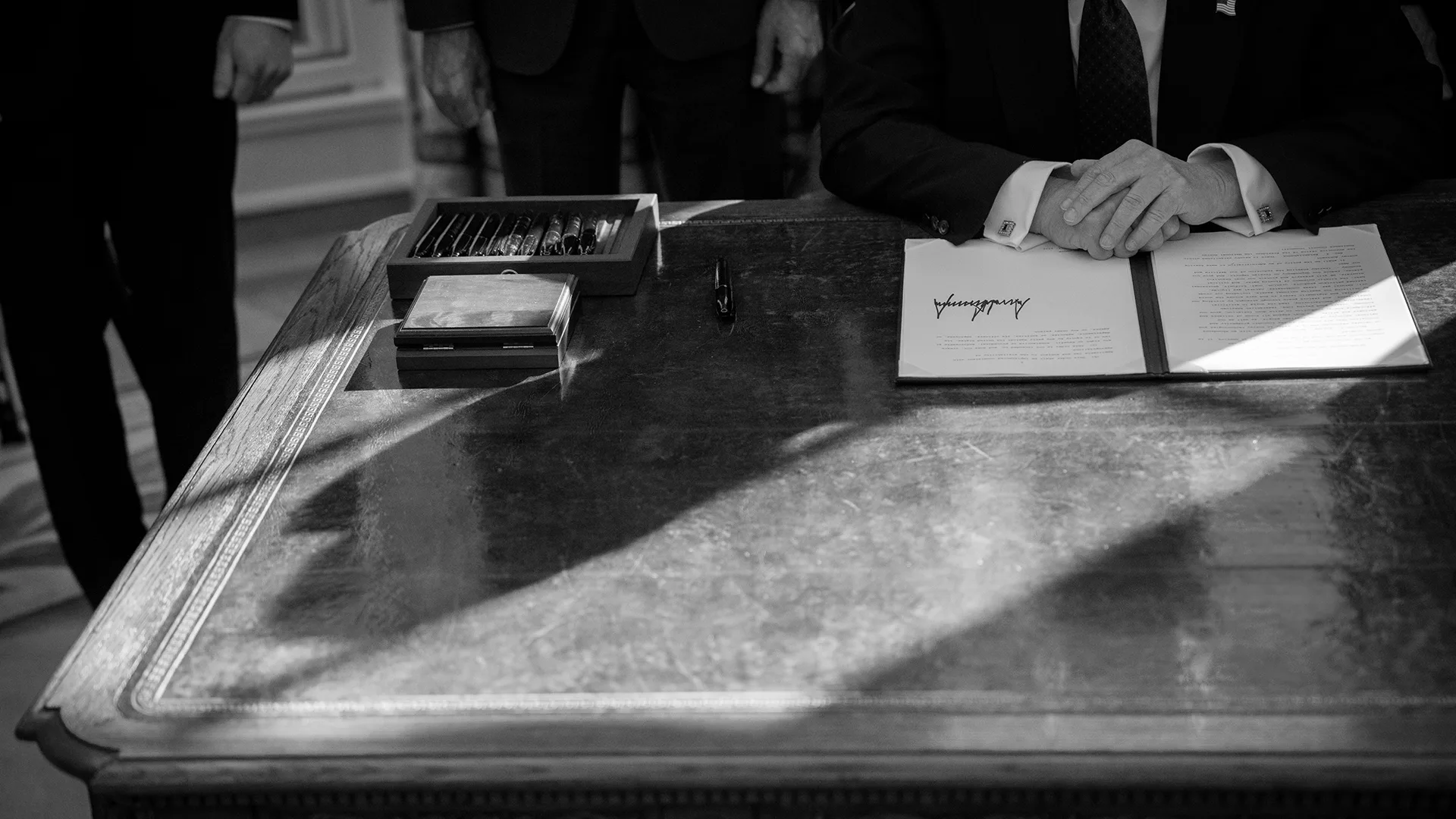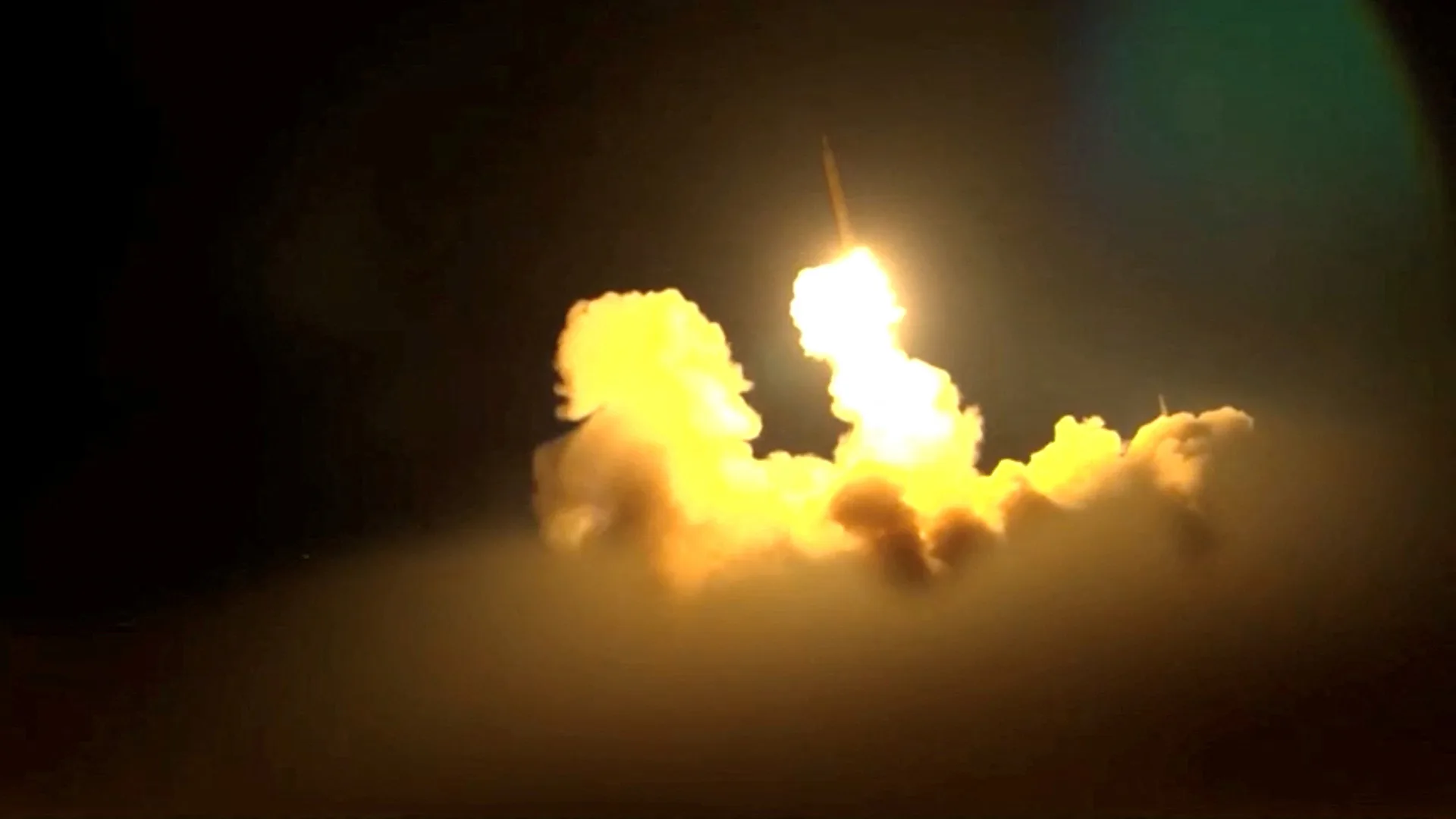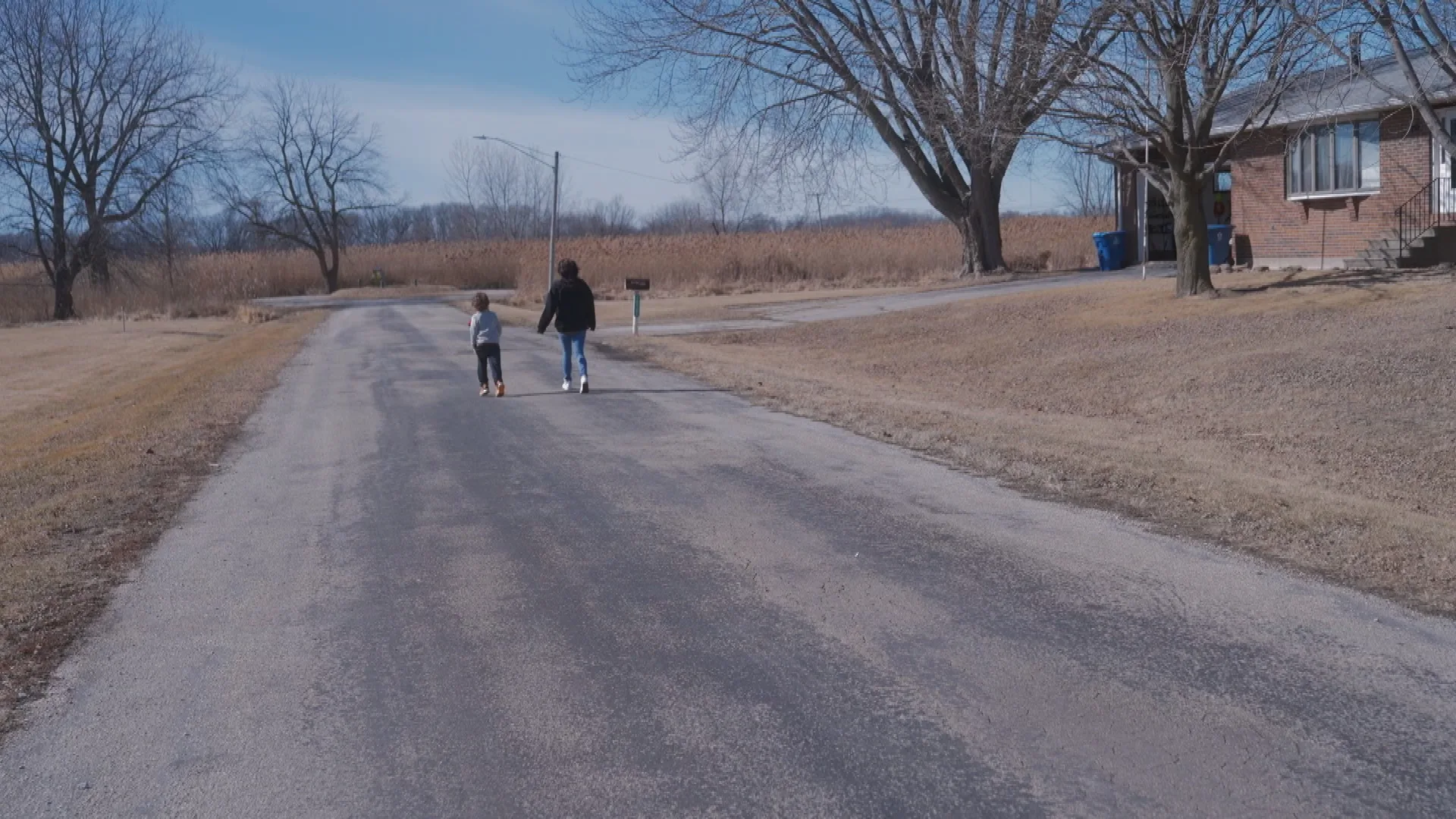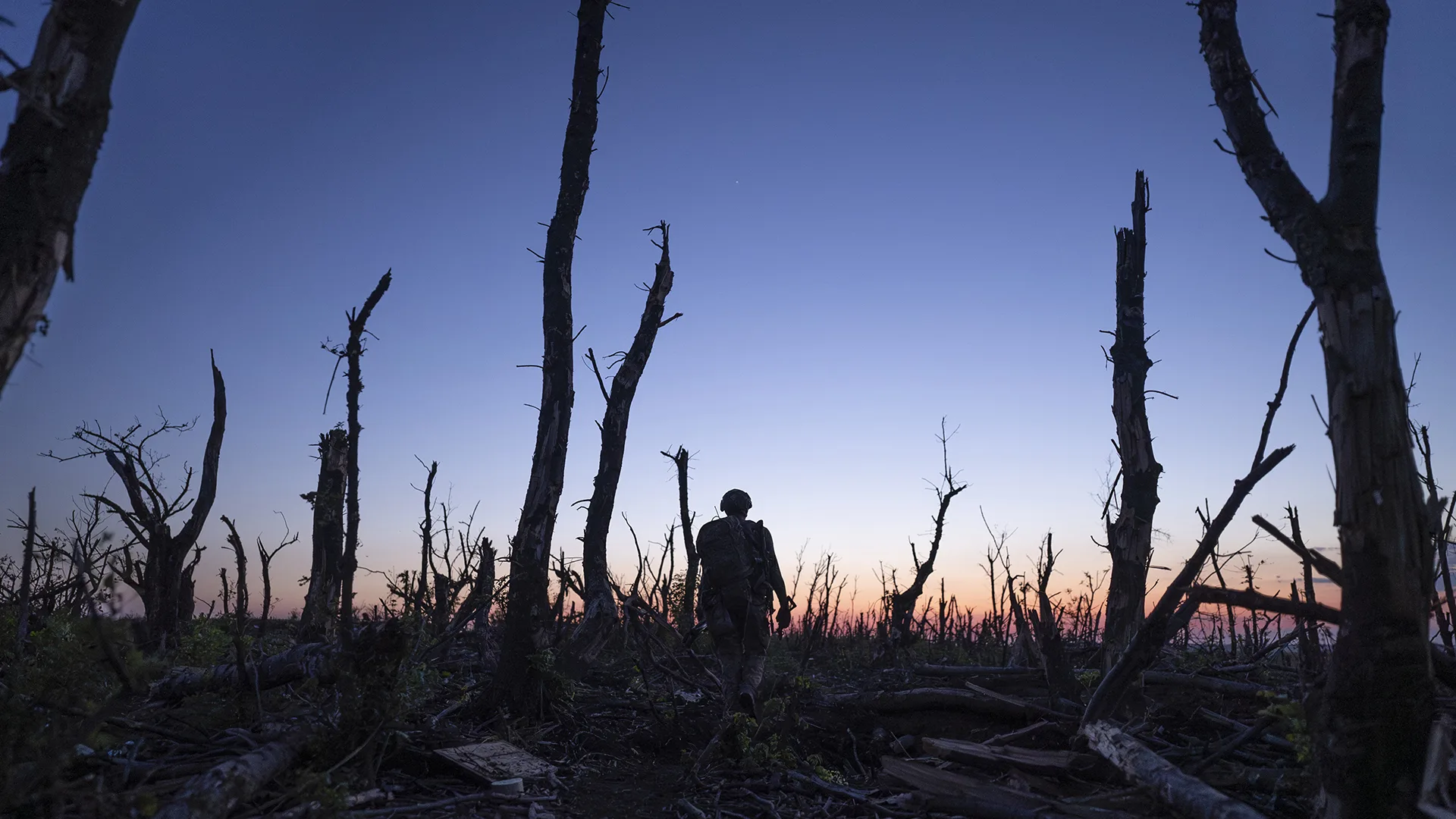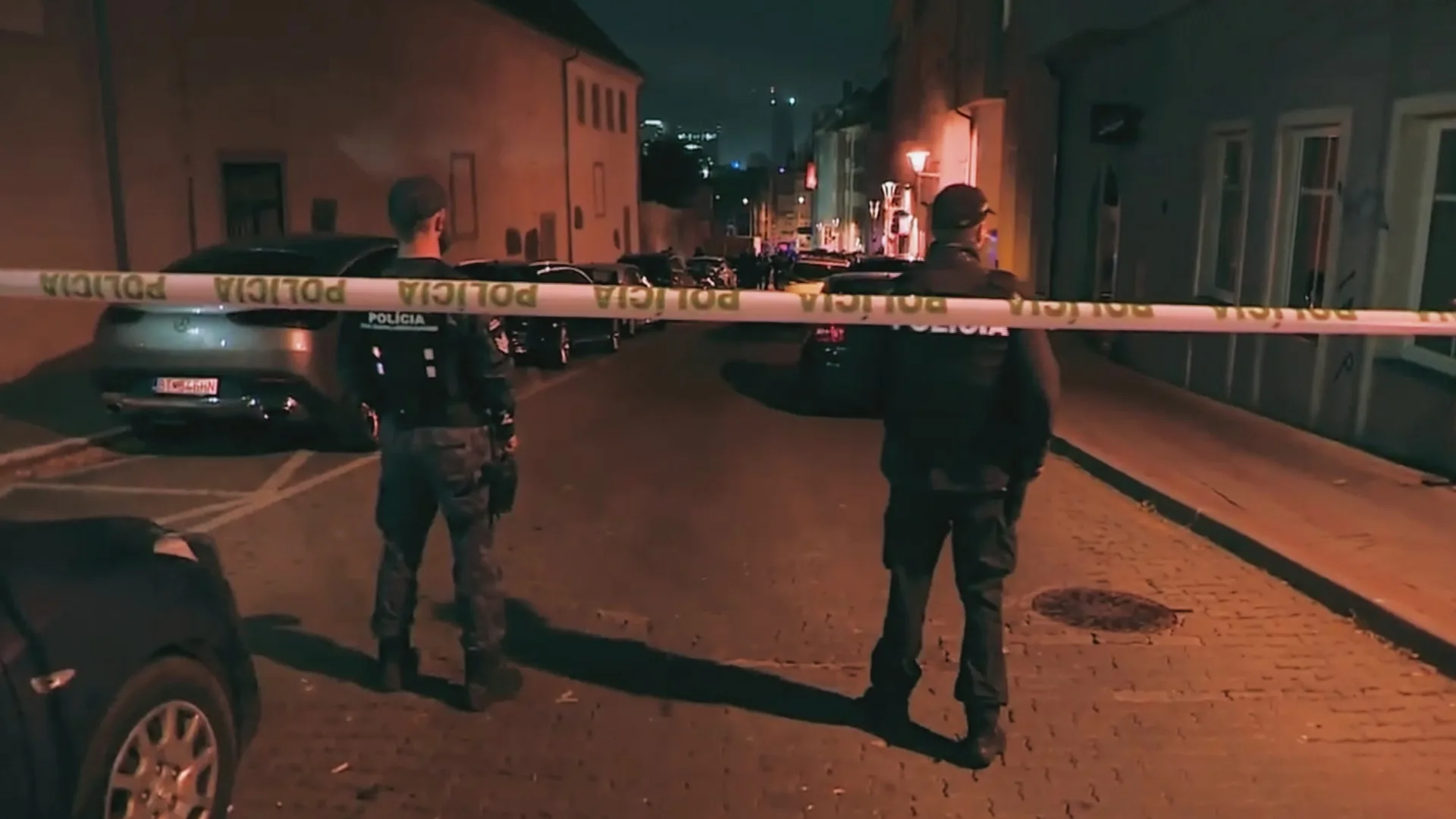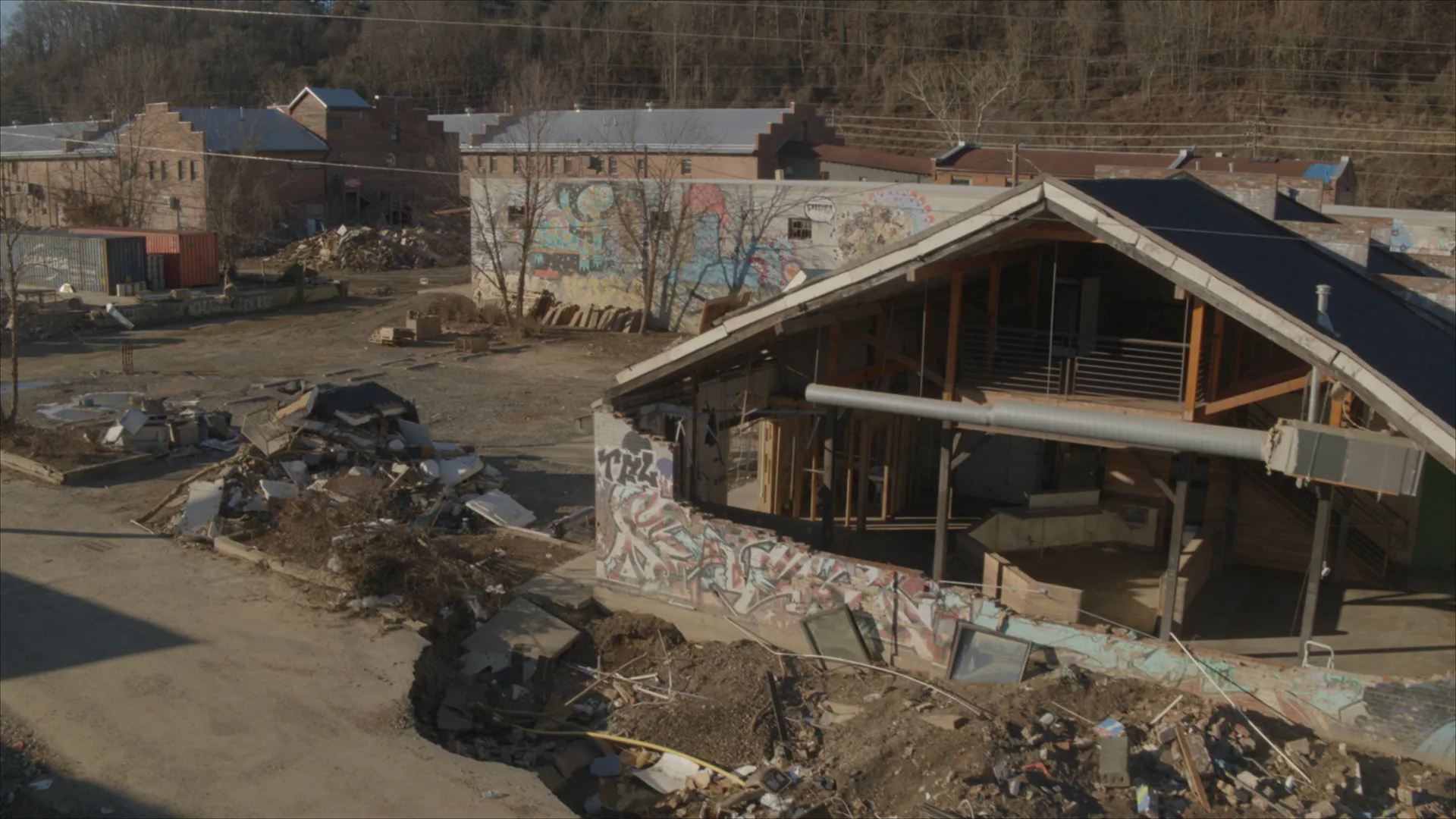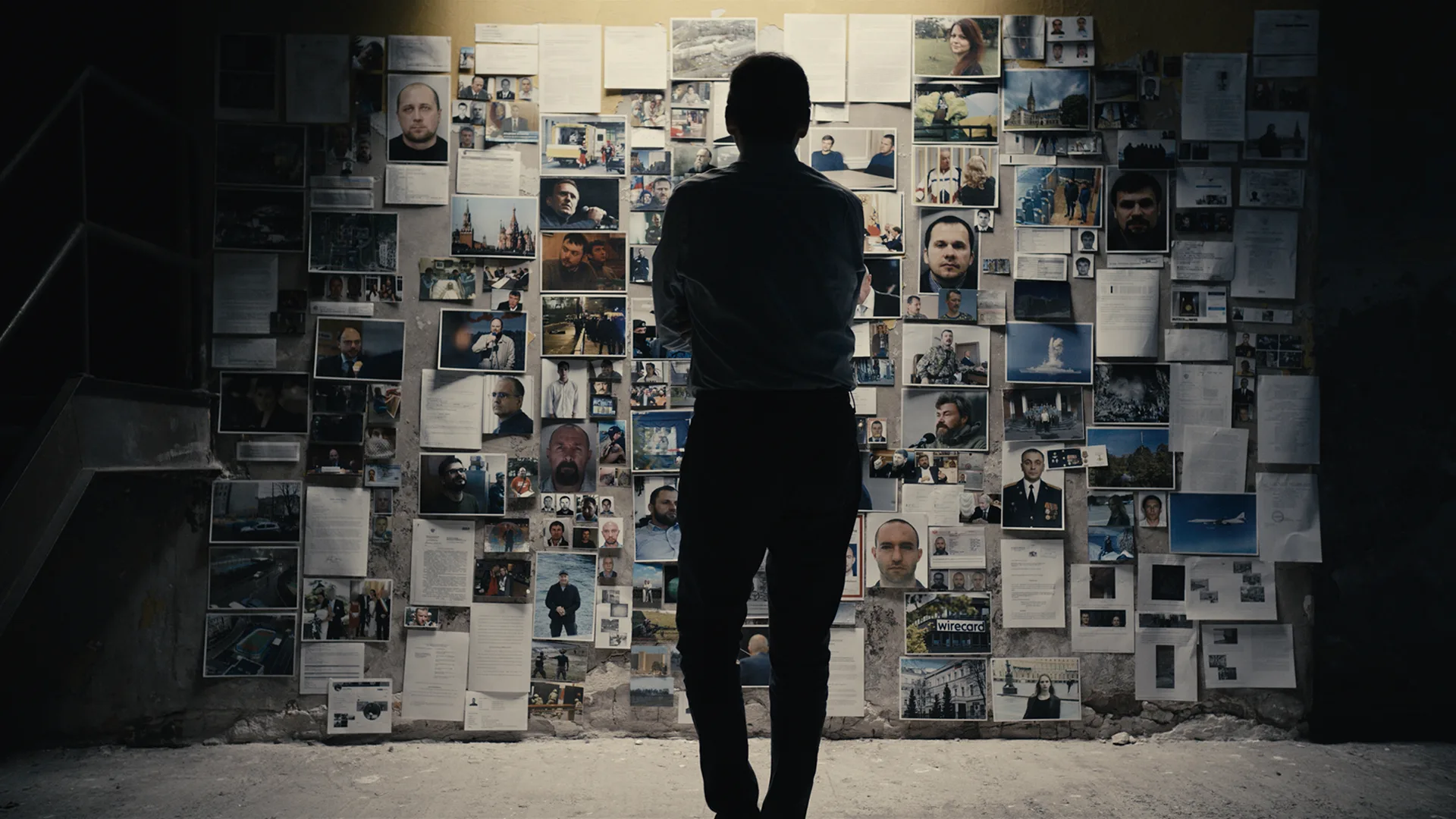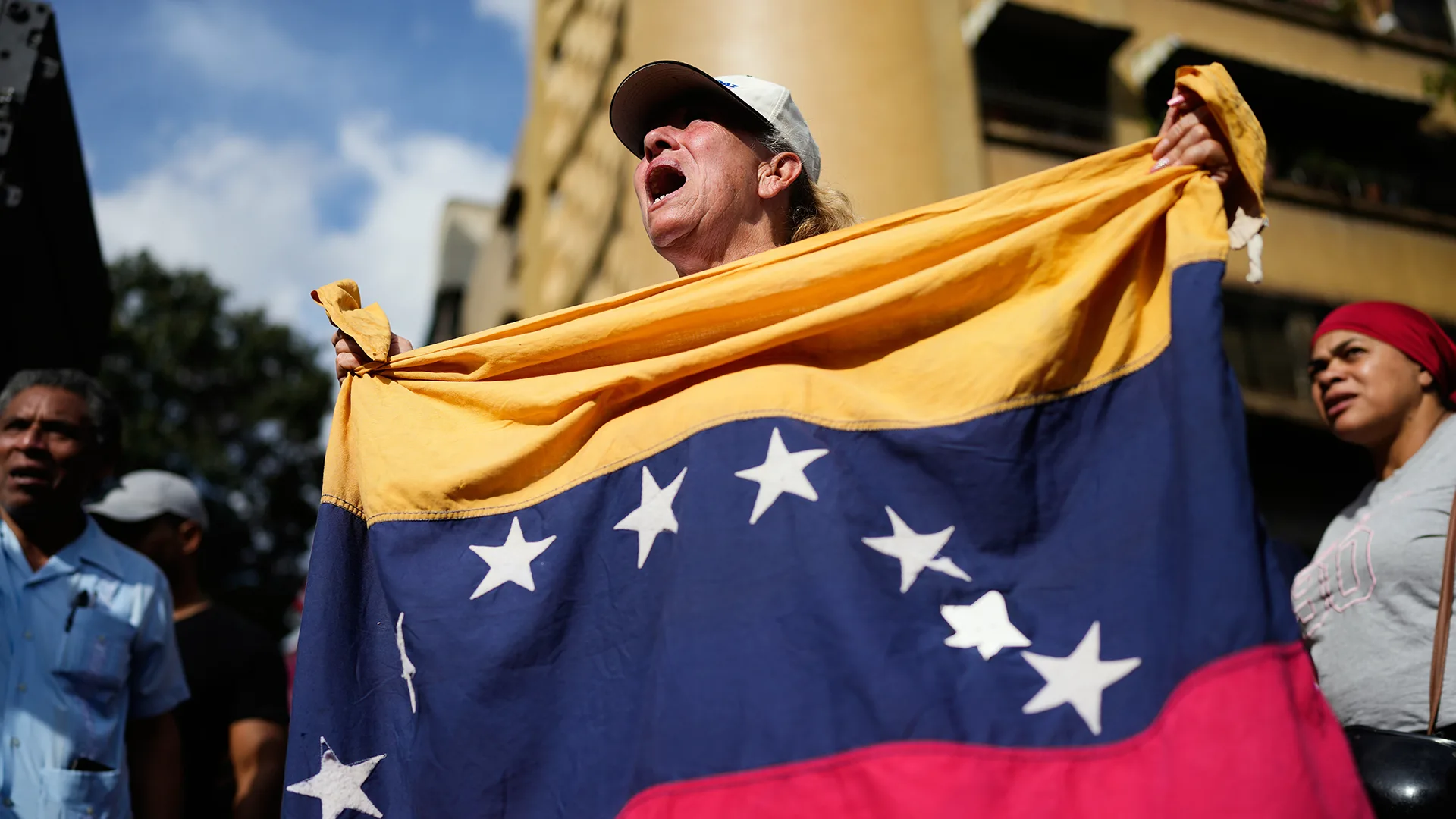Crime Scene: Bucha
December 6, 2022
25m
FRONTLINE, The Associated Press and SITU map the atrocities in Bucha, Ukraine, through eyewitness accounts, videos and exclusive 3D data
Crime Scene: Bucha
December 6, 2022
25m
Share
FRONTLINE, The Associated Press and SITU Research team up to present an exclusive visual investigation of the atrocities committed in the Ukrainian town of Bucha during Russia’s month-long occupation earlier this year.
Drawing on hundreds of hours of CCTV footage, intercepted phone calls and a 3D model of Bucha, the collaborative investigation maps the scope of the carnage — more than 450 deaths in all — and with forensic detail charts how Russian soldiers ran “cleansing” operations.
Produced by
Transcript
Credits
Journalistic Standards
Support provided by:
Learn More
Most Watched
The FRONTLINE Newsletter
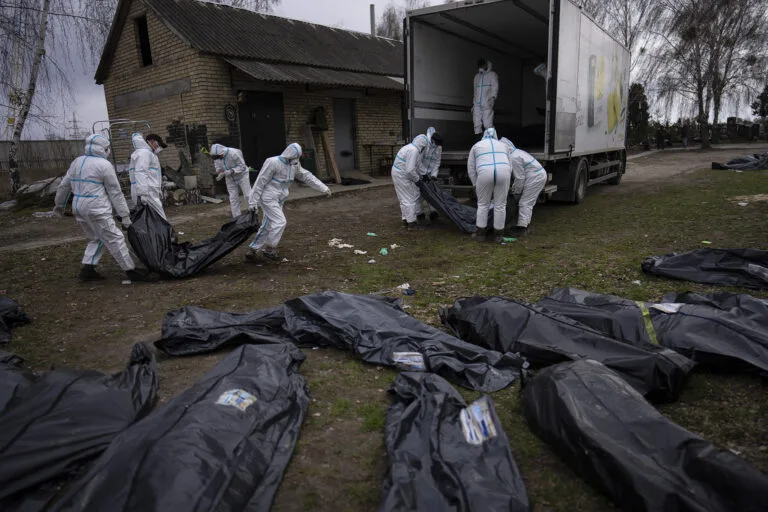
How Russian Soldiers Ran a “Cleansing” Operation in Bucha
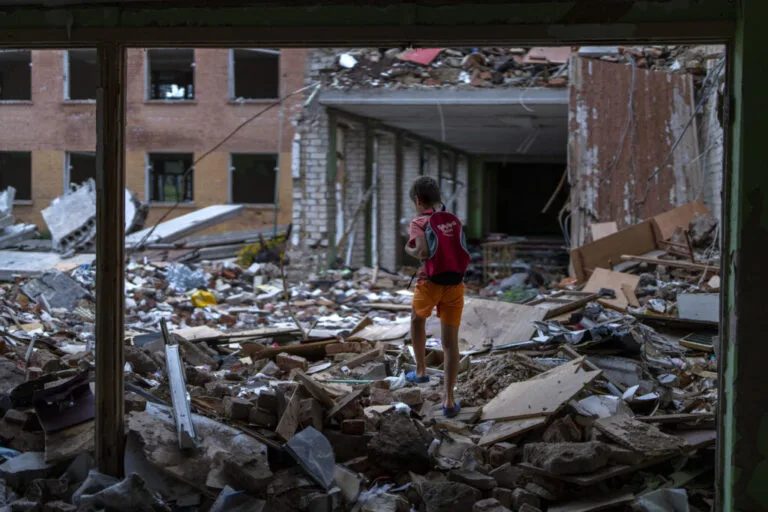
War Crimes Watch Ukraine: More Than 650 Documented Events
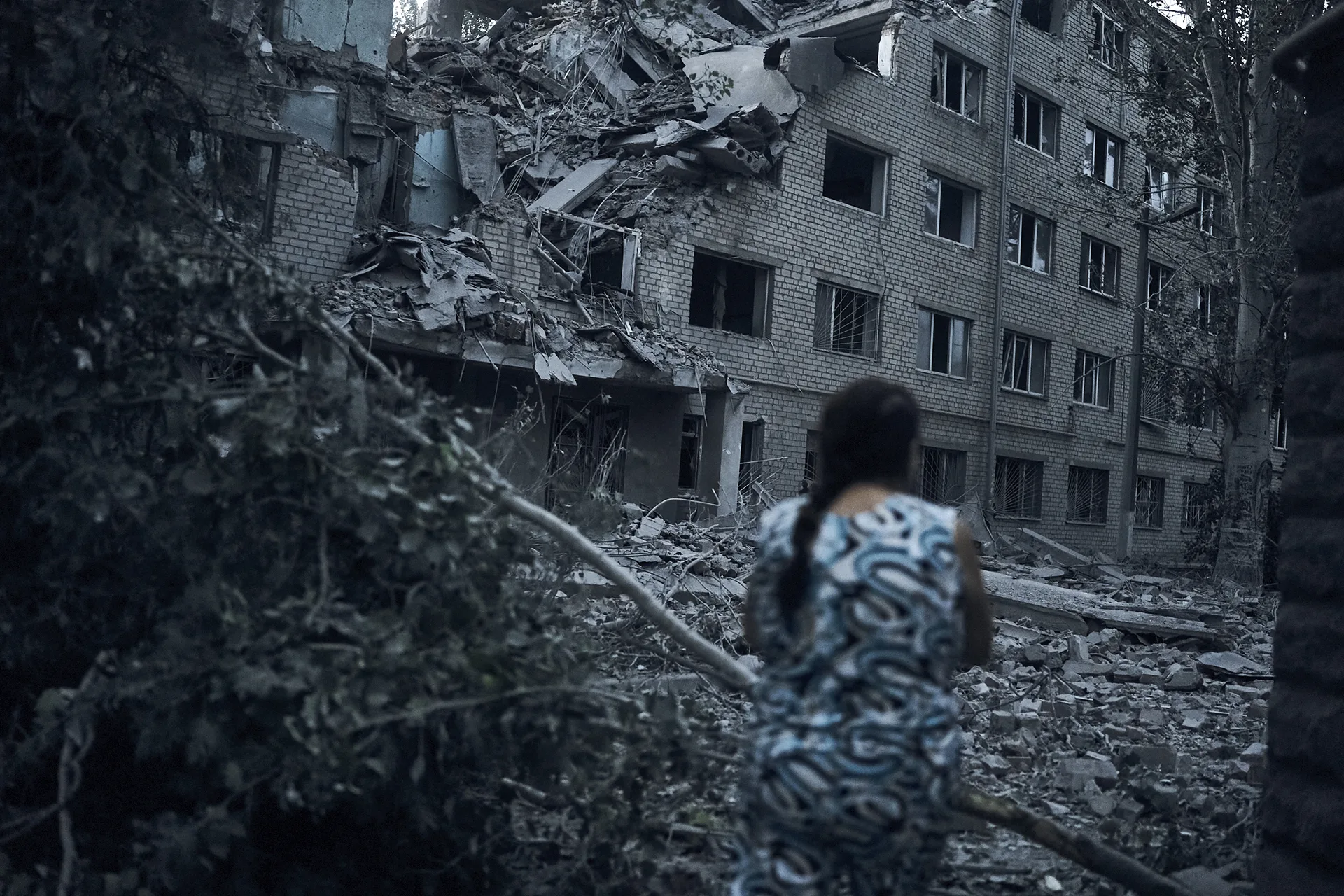
Putin’s Attack on Ukraine
Related Stories
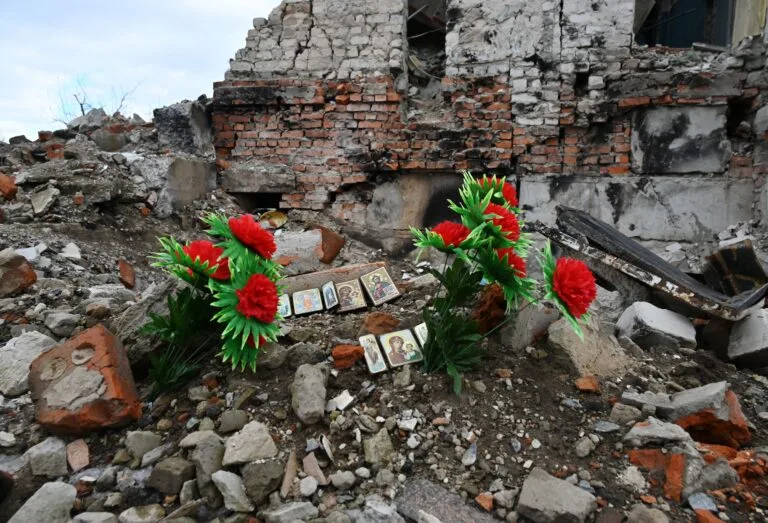
Russia’s Invasion of Ukraine, One Year Later

How Russian Soldiers Ran a “Cleansing” Operation in Bucha
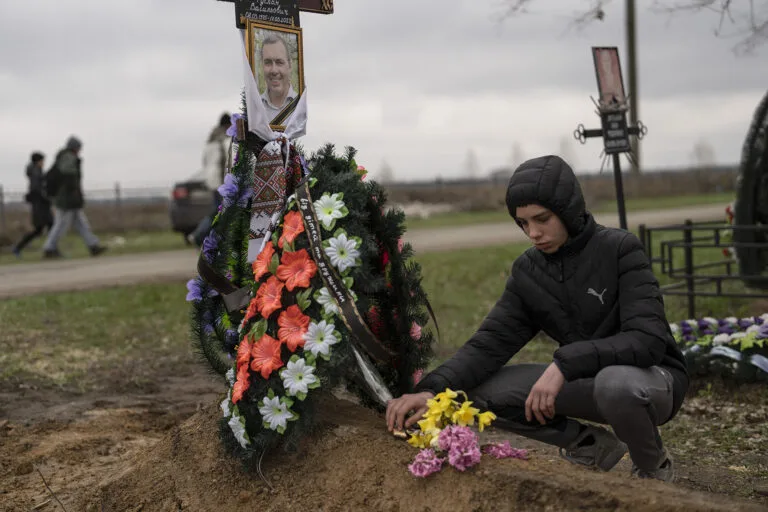
‘This Tears my Soul Apart’: A Ukrainian Boy and an Execution
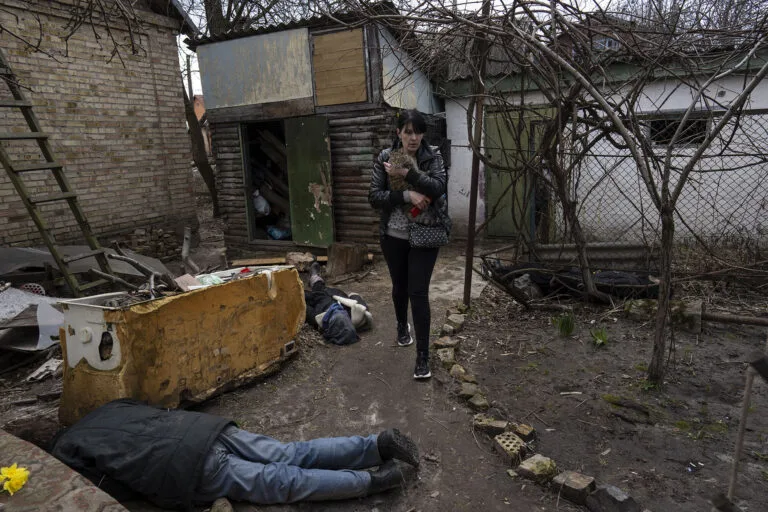
War Crimes Watch: A Devastating Walk Through the Horrors of Bucha, Ukraine
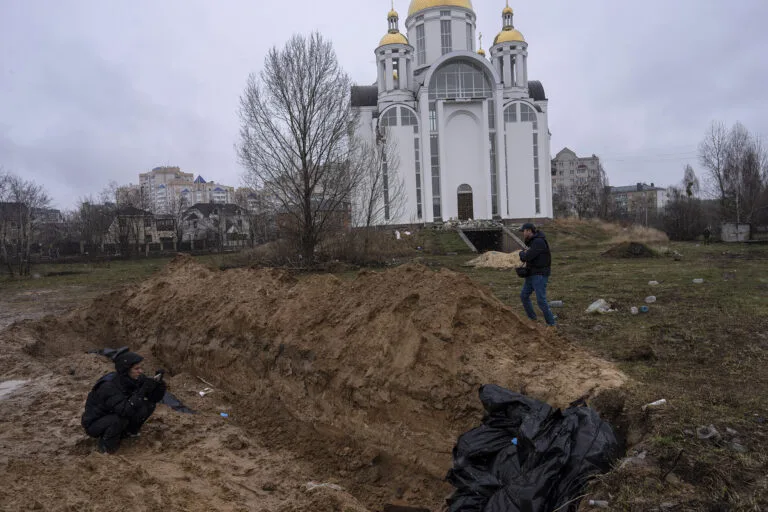
War Crimes Watch: Hard Path to Justice in Bucha, Ukraine, Atrocities

Putin’s Attack on Ukraine

War Crimes Watch Ukraine: More Than 650 Documented Events
Related Stories

Russia’s Invasion of Ukraine, One Year Later

How Russian Soldiers Ran a “Cleansing” Operation in Bucha

‘This Tears my Soul Apart’: A Ukrainian Boy and an Execution

War Crimes Watch: A Devastating Walk Through the Horrors of Bucha, Ukraine

War Crimes Watch: Hard Path to Justice in Bucha, Ukraine, Atrocities

Putin’s Attack on Ukraine

War Crimes Watch Ukraine: More Than 650 Documented Events
ANNOUNCER:
This program contains graphic content which may not be suitable for all audiences. Viewer discretion is advised.
Intercepted Phone Call 17:52 March 17, 2022
FEMALE VOICE:
[Speaking Russian] Yes?
MALE VOICE:
[Speaking Russian] Mama, hi.
FEMALE VOICE:
[Speaking Russian] Where are you?
MALE VOICE:
[Speaking Russian] In Bucha.
FEMALE VOICE:
[Speaking Russian] In Bucha?
MALE VOICE:
[Speaking Russian] Bucha. Only Irpin is left. Next stop is Kyiv.
ERIKA KINETZ, The Associated Press:
At the start of the invasion of Ukraine, Russian forces expected to take the capital, Kyiv, within days.
FEMALE NEWSREADER:
Explosions rocking several cities, including the capital of Kyiv.
MALE NEWSREADER:
And there’s little stopping Russia from threatening the capital, Kyiv, itself.
ERIKA KINETZ:
But poor coordination and fierce Ukrainian resistance stalled the ground assault, causing a buildup of Russian troops in outlying towns like Bucha.
After a monthlong occupation, the Russians retreated.
MALE NEWSREADER:
Russia’s withdrawal has revealed what looked more like crime scenes than the aftermath of battle.
ERIKA KINETZ:
They left behind evidence of war crimes that shocked the world.
MALE NEWSREADER:
Bodies bearing signs of torture and rape.
ERIKA KINETZ:
I went to Bucha not long after the bodies were discovered with my colleague, AP videographer Sasha Stashevskyi. He was based in Kyiv and was one of the first journalists to arrive on the scene in early April after the Russian retreat.
ERIKA KINETZ:
We headed down a main thoroughfare called Yablunska Street to a focal point of the killings, a nondescript office building that had become a de facto headquarters for the Russians during the occupation.
And what’s the address of this building?
SASHA STASHEVSKYI, The Associated Press:
Yablunska 144.
And here was eight bodies. Some of them was clearly shot in the head, with tied hands. And some of them had, like, eyes was—
ERIKA KINETZ:
Blindfolded eyes.
SASHA STASHEVSKYI:
Yeah. Blindfolded eyes.
ERIKA KINETZ:
Sasha had documented what looked like the point-blank execution of eight men. And more bodies would keep turning up in Bucha.
In the months since then, FRONTLINE, the AP and the visual investigations firm SITU Research obtained and reviewed hundreds of hours of CCTV footage, intercepts of Russian phone calls and spoke with survivors and witnesses to show what happened in Bucha and try to identify who was responsible.
To better understand the scale of the atrocities and how the violence unfolded, we built a comprehensive 3D model of Bucha. It was based on data collected by a team of Ukrainian citizen researchers.
ERIKA KINETZ:
Bucha authorities say they recovered the bodies of more than 450 men, women and children. Nearly all of them showed signs of violent death.
We mapped where the bodies were found. Each beacon represents the location of a victim, and each death a potential war crime.
The largest concentration of bodies—nearly 40—was recovered along Yablunska Street, which runs east to west in an industrial section of town.
We met with survivors along Yablunska Street and beyond.
Natalia Vlasenko and her family lived just off Yablunska Street. In early March, her 20-year-old grandson, Dima Chaplyhin, a store clerk, filmed the Russians arriving from this second-floor terrace.
NATALIA VLASENKO:
[Speaking Ukrainian] He was on the second floor and saw the tanks and yelled, “Grandma! Grandma, tanks!”
ERIKA KINETZ:
Dima wasn’t the only one recording. One private home on Yablunska Street was outfitted with six security cameras. In the footage that we obtained from March 3, Ukrainian soldiers try to hold off the Russian advance before retreating. Soon after, dozens of Russian troops and vehicles marked with the letter V take over the street and continue to pour in. By March 4, the occupation of Bucha was nearly complete.
That’s when the Russians came for Dima.
NATALIA VLASENKO:
[Speaking Ukrainian] I begged them not to touch him. They said, [speaking Russian] “Come with us,” [speaking Ukrainian] and took him away. I held onto them. I begged them. I was on my knees. [Cries] He pointed a rifle at me and said, “If you won’t give him up the easy way, then we’ll do it the hard way.” And then Dima, poor thing, hopped out the window, in order to protect me. He left in such high spirits, saying, “Grandma, don’t worry, I will come back!”
ERIKA KINETZ:
Dima was rounded up as part of a Russian operation known as “zachistka,” or cleansing. Soldiers searched and interrogated everyone in the area to root out threats and terrorize locals into submission.
The CCTV footage offers a rare view of the Russian sweeps as they unfolded. Some people were escorted with their belongings, even pets. Others were taken by force, including this man, who was gagged and pleading.
Russian soldiers brought people to their base at 144 Yablunska. The building had been used as a bomb shelter before Russians took it over as their headquarters and base for interrogations. They also set up a field hospital and held civilians who didn’t pose a threat in the basement.
As the Russian sweeps continued, CCTV cameras also captured these nine men, including taxi driver Ivan Skyba, being led to 144 at gunpoint.
IVAN SKYBA:
[Speaking Ukrainian] They called us names like “Banderivtsi [Nazis],” saying we were spotters. They forced us to stand up and made us each grab onto the other person’s pants. Put our other hand behind our heads and look down at the ground. Then, they led us to 144 Yablunska.
ERIKA KINETZ:
When the Russians invaded, Ivan said that he and other volunteers had been manning one of three checkpoints set up along this stretch of Yablunska. As troops advanced, volunteers from the other checkpoints escaped. Ivan and his group hid in this nearby house before they were captured.
These are two different CCTV cameras, both of which are across the street from 144 Yablunska. So we have two different angles on Ivan and the other guys being marched across the street. So the Russians are shouting at them, “To the f—— right, to the right, dumbass. Where are you going? To the f—— right.” And there they go off to the right, to 144 Yablunska.
IVAN SKYBA:
[Speaking Ukrainian] They forced us on our knees right in the yard. I was scared. Then they started kicking us, asking questions. “Who are you? Why were you hiding?” They said, “I’ll make you talk.” Then they lifted Vitalii Karpenko up from his knees and shot him point blank. I watched as he fell, bleeding from the head, from his gunshot wound.
One of the guys started telling them, he was really afraid for his life and he started to tell them that we were standing at the checkpoint and that we were in the Territorial Defense. The Russians started screaming, [speaking Russian] “What? You wanted to burn us down with Molotov cocktails? We will burn you alive right now!”
[Speaking Ukrainian] Then, they grabbed me and they led me toward the building. They took me inside, put a bucket on my head and tied my hands behind my back with tape. They hit my head with something, I don’t know. I lost consciousness two or three times. But they lifted me up again, shook me and continued the beatings.
After this, a Russian came and said, “Take them outside.” I was taken to the same place where we were before. They took the bucket off of my head. I started to see what was going on outside. I saw Vitalii Karpenko dead along with three of the other men who had been in the house with us.
They kneeled me down again and put my head toward the edge of the pavement. My hands were tied behind my back. I heard one of them say, [speaking Russian] “What should we do with them?” [Speaking Ukrainian] Another one said, “Kill them.” [Speaking Russian] “But take them away first so they’re not laying around here.”
[Speaking Ukrainian] They lifted four of us up and brought us to the corner of the building. There was already a dead body lying there. His hands were bound. They asked us to stop. But Prykhodko kept walking and didn’t stop. They started shooting. I heard a shot, and he fell. I felt the bullet pierce my side. I fell, not moving, pretending to be dead.
They walked around to finish off the wounded. That’s why I did not move, because that would mean a bullet in my head. I did not move or breathe to hide the steam coming from my mouth, so they couldn’t see I was still alive. I just froze and did not move.
ERIKA KINETZ:
Ivan said he waited for his moment. Despite a head injury and gunshot to the abdomen, he managed to escape to this nearby house. Within an hour, more Russian soldiers sweeping the area found him. This time, they believed he was an injured civilian and brought him back to 144, not to be tortured or killed, but to give him medical treatment.
IVAN SKYBA:
[Speaking Russian] While I was there, medics disinfected and bandaged my wound, they gave me a pill, and put me in the basement where the civilians were hiding from the shelling.
ERIKA KINETZ:
On March 7, Ivan and the civilians sheltering in the basement were finally released. The bodies of the men executed in the courtyard outside still lay on the ground, where they would remain for weeks. I’m
That same day, after hearing that civilians were being let out, Natalia Vlasenko set out to 144 Yablunska to find her grandson Dima.
NATALIA VLASENKO:
[Speaking Ukrainian] I begged, saying, “Let me into the basement. Maybe he’s there. Maybe he’s wounded. Maybe he’s beaten up.” I thought, “He could be wounded, he could be beaten, just let him be alive.” [Cries]
ERIKA KINETZ:
But Dima was not among the civilians released. Natalia would have to wait. I’m
The violence spread far beyond Yablunska Street. When the occupation of Bucha turned from days to weeks, troops unable to reach Kyiv faced mounting losses, and they became more erratic and unpredictable.
Intercepted Phone Call 19:45 March 21, 2022
FEMALE VOICE:
[Speaking Russian] Why are you drinking? I’m
MALE VOICE:
[Speaking Russian] Everyone is like that here. It’s impossible without it here. Totally normal. It’s easier to shoot civilians. I’m sorry
ERIKA KINETZ:
In phone calls intercepted by the Ukrainian government that we verified with the help of the Dossier Center in London, Russian soldiers admitted to killing civilians.
Intercepted Phone Call 11:19 March 21, 2022
MALE VOICE:
[Speaking Russian] So, we have the order: It does not matter whether civilians or not. Kill everyone.
Intercepted Phone Call 19:38 March 21, 2022
MALE VOICE:
[Speaking Russian] Hide the f—— weapons from me! I think I’m going crazy. I’ve already killed so many f—— civilians.
FEMALE SPEAKER 1:
[Speaking Ukrainian] They barged in and told us, “Don’t go out or we will kill you!”
FEMALE SPEAKER 2:
[Speaking Ukrainian] Microwaves, phones. They took everything!
ERIKA KINETZ:
They also took over people’s homes. Security cameras from inside this residence on Yablunska Street show soldiers playing with the lights, doing laundry, even chasing a dog. They eventually discover the cameras and shoot them out.
Outside, on the streets and fields of Bucha, more bodies started to appear. Those who were not able to flee hid inside their houses, including Natalia Vlasenko and her husband, Pavlo. They stayed behind trying to find out what happened to their grandson Dima. Near the end of March, Natalia said Russian troops returned to their house.
NATALIA VLASENKO:
[Speaking Ukrainian] They took my husband to the second floor.
ERIKA KINETZ:
They began interrogating her husband, Pavlo, after discovering their son’s military cap in a closet.
NATALIA VLASENKO:
[Speaking Ukrainian] “He’s military?” [Speaking Russian] “So he’s defending Kyiv?” [Speaking Ukrainian] They probably beat my husband because he responded, screaming in pain, [speaking Russian] “Yes. Yes, he’s defending Kyiv.” Then there was silence.
[Speaking Ukrainian] I walked around the entire yard, then came out onto the street and it looked as if no one was around. Then a neighbor came and said, “I found your Pashunya [Pavlo]. But don’t go there because it’s scary to even look.” I ran up. God, his little body was curled up, charred. The head also was shot.
The rain poured. I was digging a hole, crying, screaming. Then a neighbor came out and helped. We covered him up as much as we could with a picket fence so that the dogs wouldn’t dig him up.
ERIKA KINETZ:
By the end of the month, Russian forces gave up on their attack on Kyiv and pulled out of Bucha. Day by day, people found more bodies, of their friends, families and neighbors.
Soon after Natalia buried her husband, Dima’s body was discovered on the grounds of 144 Yablunska St.
NATALIA VLASENKO:
[Speaking Ukrainian] Oh, God, my baby. We stayed here for you. [Cries] Oh, God, your life turned to ashes!
ERIKA KINETZ:
Dima was just one of the hundreds of bodies found throughout Bucha. The full scale of the horrors— more than 450 deaths—wouldn’t be known for months.
What happened along Yablunska Street is now case number one for Ukraine’s war crimes prosecutors. Taras Semkiv from the Prosecutor General’s Office is in charge of the case.
TARAS SEMKIV, Ukrainian war crimes prosecutor:
[Speaking Ukrainian] This is in fact the place where the eight bodies that are in this photo were found.
The military officers were there. The actual interrogations were not conducted by ordinary soldiers. The interrogations were conducted by the officers of the Russian army.
ERIKA KINETZ:
Oh, God. These poor people.
TARAS SEMKIV:
[Speaking Ukrainian] These were people who had been found in the neighboring houses not far from 144 Yablunska. They were hiding in the basements of those houses. They were found. The hands of those individuals were tied and they were deprived of any possibility to resist. And the fact that they were executed was obvious.
ERIKA KINETZ:
What do you think the odds are of you getting any of the people responsible for the atrocities at 144 Yablunska into an actual court of law and prosecuting them in a court?
TARAS SEMKIV:
[Speaking Ukrainian] I will do everything in my power to ensure that these people are convicted. I think our chances are quite good. We’ve already gathered a lot of evidence. We believe it qualifies as a war crime and violates the laws of war.
ERIKA KINETZ:
Semkiv said that those responsible for what happened to Ivan, Dima and the others on March 4 were from Russia’s 76th Guards Airborne Assault Division.
TARAS SEMKIV:
[Speaking Ukrainian] We have identified the commanders of these units. And we have also identified a large number of people who were in Bucha, specifically on Yablunska Street at that time.
ERIKA KINETZ:
Those commanders are Maj. Gen. Sergei Chubarykin and his boss, Col. Gen. Alexander Chaiko.
Ukrainian prosecutors are pursuing the generals for their roles in leading the invasion of Ukraine. But they are still gathering evidence that could link them to specific crimes, like 144 Yablunska.
The International Criminal Court in the Hague is also investigating potential war crimes cases.
Bucha was a turning point, when the world called for accountability. But with the war in Ukraine still raging, it is too early to say who will be held accountable for what happened in Bucha and beyond.
PRODUCED AND EDITED BY Jon Nealon
PRODUCED AND REPORTED BY Erika Kinetz
PRODUCED & DIRECTED IN UKRAINE BY Thomas Jennings Annie Wong
ADDITIONAL PRODUCING AND REPORTING BY Oleksandr Stashevskyi, AP Michael Biesecker, AP
ADDITIONAL PRODUCING BY Vasilisa Stepanenko, AP Taras Lazer Adam Pemble, AP Allen G. Breed, AP
SENIOR PRODUCERS Jeannie Ohm, AP Carla Borras Frank Koughan
DIRECTORS OF PHOTOGRAPHY Tim Grucza Scott Anger Roman Synchuk
ADDITIONAL EDITING Fanny Lee Pascal Akesson Fritz Kramer Michelle Mizner Chris O’Coin Deborah Peretz
ASSISTANT EDITORS Julio Ramirez Thialy Sow Alex LaGore
ADDITIONAL ASSISTANT EDITING Christine Giordano Tim Meagher
ARCHIVAL PRODUCER Lindsey Schneider
ONLINE EDITOR/COLORIST Jim Ferguson
SOUND MIX Christopher D. Anderson, C.A.S.
VISUAL INVESTIGATION SITU Research Jus Talionis
TRANSLATION Solomiia Hera Yuliya Kazdobina Dana Kurylyk
FOR THE ASSOCIATED PRESS
SENIOR PRODUCER, VISUAL INVESTIGATIONS Jeannie Ohm
INTERNATIONAL INVESTIGATIONS EDITOR Mary Rajkumar
ACTING GLOBAL INVESTIGATIONS EDITOR Alison Fitzgerald Kodjak
VICE PRESIDENT – NEWS, INVESTIGATIONS, ENTERPRISE, PARTNERSHIPS & GRANTS Ron Nixon
SENIOR VICE PRESIDENT & EXECUTIVE EDITOR Julie Pace
FOR SITU RESEARCH
PROJECT COORDINATOR Candice Strongwater
RESEARCHER Helmuth Rosales
SENIOR RESEARCHER/TECHNICAL LEAD Bora Erden
DIRECTOR AND FOUNDING PARTNER Brad Samuels
ARCHIVAL MATERIALS The Associated Press AP Archive Vlasenko Family
ADDITIONAL MATERIALS ABC News Andriy Tsaplienko Kyiv City Council Ministry of Internal Affairs of Ukraine Ministry of Defense of the Russian Federation NBC News PBS NewsHour Rubryka State Emergency Service of Ukraine Jus Talionis Ukrainian government
SPECIAL THANKS Yurii Bielousov The Dossier Center The Royal United Services Institute The Centre for Information Resilience Henry Schlottman
FOR FRONTLINE
DIRECTOR OF POST PRODUCTION Megan McGough Christian
SENIOR EDITOR Barry Clegg
EDITOR Brenna Verre
EDITOR Joey Mullin
ASSISTANT EDITORS Christine Giordano Alex LaGore Tim Meagher Peter Norton
PRODUCTION ASSISTANT Stevie Jones
FOR GBH OUTPOST SENIOR DIRECTOR OF PRODUCTION TECHNOLOGY Tim Mangini
INTERNS Joe Adams Joanna Hou Hannah Loss Daejah Woolery Olivia Yarvis
FRONTLINE / EMMA BOWEN FELLOW Sharon Boateng
SERIES MUSIC Mason Daring Martin Brody
EXECUTIVE ASSISTANT Will Farrell
DIRECTOR OF IMPACT AND EXTERNAL RELATIONS Erika Howard
DIGITAL WRITER & AUDIENCE DEVELOPMENT STRATEGIST Patrice Taddonio
PUBLICITY & AUDIENCE ENGAGEMENT COORDINATOR Julia Heffernan
DIGITAL PRODUCER / EDITOR Tessa Maguire
MANAGER, PUBLIC RELATIONS AND COMMUNICATIONS Anne Husted
PODCAST PRODUCER Emily Pisacreta
ARCHIVES & RIGHTS MANAGER John Campopiano
BUSINESS ASSOCIATE Sean Gigliotti
CONTRACTS CONSULTANT Junshi Lu
FOR GBH LEGAL Eric Brass Suzy Carrington Jay Fialkov
SENIOR CONTRACTS MANAGER Gianna DeGiulio
BUSINESS MANAGER Sue Tufts
BUSINESS DIRECTOR Mary Sullivan
SENIOR DEVELOPER Anthony DeLorenzo
LEAD DESIGNER FOR DIGITAL Dan Nolan
FRONTLINE/COLUMBIA JOURNALISM SCHOOL FELLOWSHIPS TOW JOURNALISM FELLOW Chantelle Lee
ABRAMS JOURNALISM FELLOW Julia Ingram
FRONTLINE/NEWMARK JOURNALISM SCHOOL AT CUNY FELLOWSHIP TOW JOURNALISM FELLOW Bruce Gil
FRONTLINE/FIRELIGHT INVESTIGATIVE JOURNALISM FELLOWS Cristina Ibarra Ursula Liang
EDITORIAL CONSULTANTS Lauren Prestileo Callie T. Wiser
SENIOR DIGITAL PRODUCER / EDITOR Miles Alvord
HOLLYHOCK FILMMAKERS IN RESIDENCE Christina Avalos Marcia Robiou
SERIES PRODUCER AND EDITOR Michelle Mizner
DEPUTY DIGITAL EDITOR Priyanka Boghani
DIGITAL EDITOR Jennifer Wehunt
EDITORIAL COORDINATING PRODUCER Katherine Griwert
POST COORDINATING PRODUCER Robin Parmelee
SENIOR EDITOR AT LARGE Louis Wiley Jr.
FOUNDER David Fanning
SPECIAL COUNSEL Dale Cohen
DIRECTOR OF AUDIENCE DEVELOPMENT Maria Diokno
SENIOR PRODUCERS Dan Edge Frank Koughan
SENIOR PRODUCER, SPECIAL PROJECTS & INNOVATION Carla Borrás
SENIOR EDITOR & DIRECTOR, LOCAL JOURNALISM Erin Texeira
SENIOR SERIES PRODUCER Nina Chaudry
SENIOR EDITOR, INVESTIGATIONS Lauren Ezell Kinlaw
MANAGING EDITOR Andrew Metz
MANAGING DIRECTOR Janice Hui
EXECUTIVE PRODUCER & EDITOR-IN-CHIEF Raney Aronson-Rath
A FRONTLINE production with The Associated Press, SITU Research and 2over10 Media
© 2022 WGBH Educational Foundation All Rights Reserved.
FRONTLINE is a production of GBH which is solely responsible for its content.
Explore
Policies
Teacher Center
Funding for FRONTLINE is provided through the support of PBS viewers and by the Corporation for Public Broadcasting, with major support from Ford Foundation. Additional funding is provided the Abrams Foundation, Park Foundation, John D. and Catherine T. MacArthur Foundation, Heising-Simons Foundation, and the FRONTLINE Trust, with major support from Jon and Jo Ann Hagler on behalf of the Jon L. Hagler Foundation, and additional support from Koo and Patricia Yuen. FRONTLINE is a registered trademark of WGBH Educational Foundation. Web Site Copyright ©1995-2025 WGBH Educational Foundation. PBS is a 501(c)(3) not-for-profit organization.


